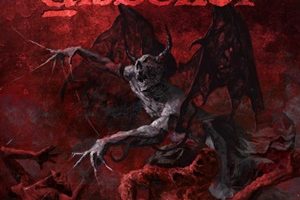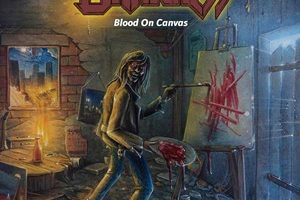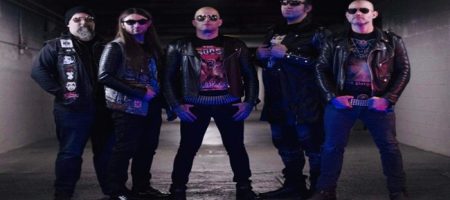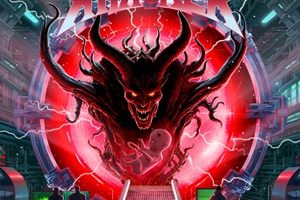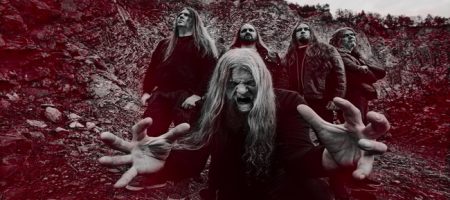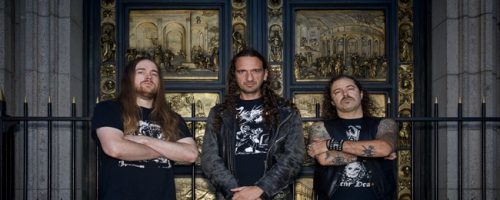War Curse – Time for Confession
Sunday, 22nd October 2023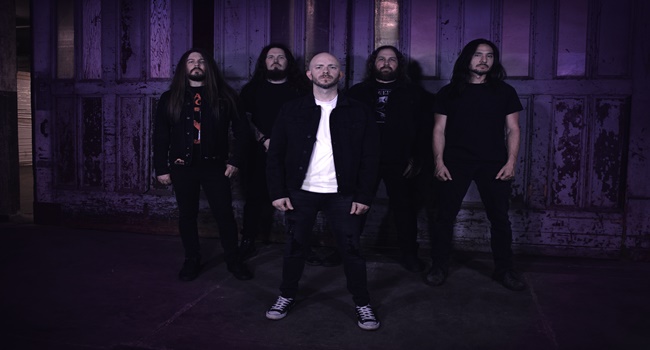
Photo: Brian Vogel
It’s always a joy to catch up with musicians you’ve developed good friendships with over the years – especially when you are able to watch the development of their craft as artists. War Curse is one of those bands ready to make huge strides not only for their work ethic, but their metal output through their third album Confession. Those listeners who want a heavy/thrash record that possesses dynamics and different influences to make for a focused, memorable effort without sounding outdated, this should be a mandatory album to emblazon into your collection. We spoke with guitarist Justin Roth who brought us up to date on signing with Metal Blade/ Blacklight Media, the attention to detail surrounding the songwriting for Confession, plus numerous thoughts regarding the states of thrash/death metal, US versus European versus Latin America support for metal, food for thought regarding touring practices, and what’s in store for the War Curse future.
Dead Rhetoric: Confession is the third War Curse studio album – securing a new deal with Blacklight Media/Metal Blade Records. What made this deal most attractive to the band, and do you believe the extra downtime due to the pandemic ensured the band the right time to create the most versatile, dynamic effort to date for the group?
Justin Roth: The thing with the Metal Blade/Blacklight deal… we had initial conversations with them while we were shopping the Eradication album. We were hopeful to continue that conversation when it came to release the new album. They came to the table in 2020 and wanted to talk to us, which was cool. We didn’t have an album finished, we signed a deal with them without an album – which is typically not the norm for a band like ours. Normally you hand over a finished album and make a deal based on that album. But we did the deal on reputation and past sales alone. It meant a lot that they would take a chance on us like that. A lot of labels probably wouldn’t have. Metal Blade is one of the labels that I’ve always admired. Many of my favorite albums from childhood forward have had the razor blade or the axe logo on the album jacket. The prestige of having that on an album is cool – I think it means something to a lot of fans, and it validates our hard work.
The Blacklight Media tie in is a cool thing – that’s the pet project of celebrity chef Chris Santos (of Chopped). Letting my inner nerd show a little, I’m a big Chopped fan. I love the show. Just getting to talk to Chris is super cool. That’s almost cooler than anything involving music, the band, whatever. Chris is a rad dude. For his involvement, he puts a little bit of financial backing behind the bands that he works with. We get all the perks of Metal Blade, plus the extra bump from Chris. He’s got a lot of connections and opens a lot of doors for us. It’s a cool collaborative effort between those two entities. A very good team and good people to deal with. It’s unusual for me, as someone who has had to do everything myself, to have ten people that at any given time, if I need a very specific thing done, there is a person there that does that specific thing and does it well. That’s the other big advantage when you sign with a bigger label versus a small operation. Just having a great team around you.
(The extra time) gave us the necessary time to write a complete album. We didn’t feel rushed. We signed the deal with Metal Blade in 2020. Here we are in 2023 and the record is just getting ready to come out. Clearly it wasn’t rushed. Part of that is we couldn’t get into a studio, a lot of the studios were closed down. Once the depression and anger of the whole 2020 situation and the tours we lost started to blow over, I had nothing to do but write songs, write riffs. Blaine and I spent countless hours just holed up in his house working on new songs, working on ideas. Murphy would join us. Sometimes all five of us would cram into Blaine’s studio and write. The songs were allowed the time they needed to become better developed songs. Unlike previous albums, the songs are shorter, there’s not a whole lot of fat or screwing around – what I call ‘audible masturbation’. If a part of the song was there because we wanted to play a fun riff but it didn’t serve a point, we cut it. We used the time to do true pre-production, recording the songs multiple times. I’ve got four-six versions of some songs, songs were rewritten, parts were reimagined, vocals were changed, lyrics were changed. For good, bad, or other, we had enough time to dissect the songs and create the album that we wanted to create. The end result shows a much more mature approach to the songwriting, the songs feel more focused and more complete.
Dead Rhetoric: In some of the background information regarding the new release, you mention incorporating influences outside of the metal sphere as far as what you listen to, which helped shape the songs in an organic manner that was very fresh. Do you believe that diversity in input can develop better songs for War Curse long-term, because you aren’t subjected to an ‘all-metal’ influence bank to draw from?
Roth: Murphy and myself, we have been in bands together for almost twenty years at this point. We’ve played every genre of music you can imagine. Between the two of us, Murphy has been in country bands, once upon a time him and I were in a band that kind of sounded like Fall Out Boy. Lots of punk and hardcore bands. Crossover metal bands before they were cool. We’ve run the gamut. I’ve never been one of these people that wakes up first thing in the morning and just starts blasting metal, who only listens to metal. I’ve always kept a wide array of influences. Whether or not some of it finds its way into the songwriting, it may on a subconscious level.
I think the quote you’re talking about – that wasn’t so much the stuff I was listening to as it was bringing in Blaine and him having a different set of influences. This was the first album I wrote with Blaine. Having him there, his metal influences are different than mine or Murphy’s because he came into metal a little later. He came into metal in the Killswitch Engage-era. He’s almost ten years younger, the next generation from Murphy and myself. He listens to a lot of the Gothenburg bands, the metalcore stuff, a lot of modern bands. And I like a lot of that stuff too. Having him as a writing partner with a different set of tricks, different set of ears, him writing vocal melodies, guitars having to work with vocals, it changed the direction of some things that we might not have done prior.
I listen to a lot of bands that get away with a lot of stuff. If you listen to thrash metal – it’s very rigid and by the rules. If you do something outside of those rules, then everyone wants to shit on you. Thrash metal is probably the genre that is most plagued by purists. If you sing a certain way, you’re out. If you play a riff that doesn’t conform to the rules, you’re out. If you use a certain effect on your guitar or have additional layers in your songs, you’re out. There are just so many rules, and you have to fit into this neat little box. This was the first time I just didn’t really give a shit. I never set out to be a thrash metal band – we just happened to write music that was thrash metal. Listening to other bands do cool stuff, and listening to bands like Architects who will explore new avenues, bringing in an industrial influence, or Bleed From Within that bring in symphonic, big string sections. It brings their music to another level, and I just want to know why I can’t do that kind of stuff due to a genre tag that’s been placed on my music. Moving forward I think we will. We played with strings a little in “Eradication” (the song). This time around we wrote an album that will piss off a few purists, sure, but hopefully appeals to a couple of people that like a little bit of variety in their music.
Dead Rhetoric: “Miracle Broker” is the first single/video from the album. Was this the ideal track to preview the record, and can you discuss the lyrical/visual content that ties in together surrounding the band’s performance footage for the clip?
Roth: Yeah. I picked the first single, the label picked singles two and three. This was my pick, if it’s a good choice I get credit, and if it’s a bad one, I gotta take the blame. I think it’s a cool track because, one – it’s kind of short. It clocks in at just around three minutes, which for us is incredibly short. It’s straight to the point, hard-hitting. It has some elements that felt like War Curse, and it had some elements that would tease what’s on the rest of the album, without being a complete shock. If we had led with a couple of other songs, it might have seemed like we were coming from left field. I think it’s a kick ass song, probably my favorite song I’ve ever written, so selfishly I thought it was the ideal track to lead with.
Lyrically, I wrote that song kind of… you ever watch The Righteous Gemstones? (laughs) I love watching these crazy televangelists. Paraplegics jumping out of wheelchairs, the blind men who can suddenly see, the ridiculous things that people believe in. I had the title “Miracle Broker” before I had any of the lyrics. I keep a word document in my phone, and “Miracle Broker” could have applied to a mid-evil snake oil salesman, politician. To be honest that’s what I see in most of these crazy religious leaders, these rich ass megachurch leaders. They’re well-dressed con-men selling snake oil to idiots. They’re totally ridiculous characters, which tied in perfectly with the video. There’s not a whole lot left to the imagination with that one.
Dead Rhetoric: You’ve always chosen great cover songs that may not necessarily be the norm but pay tribute to artists that you believe are worthy of mention. Discuss the Grip Inc. track you chose this time with “Rusty Nail” from the Nemesis album – as it’s also in honor of your former bassist Jason VieBrooks who played with the band, correct?
Roth: Definitely. While Jason was in the band, we had talked about doing a Grip Inc. cover quite a few times. For one reason or another, it just never came together. With Jason leaving the band, and this being Johnnie’s first album with War Curse, he toured with us during the Eradication years but Jason recorded the bass on that album. It felt like a cool send off for his contribution. I know Grip Inc. was a band that meant a lot to (Jason). I was a big Grip Inc. fan in the 90’s and so were Murphy and James. They were a great band. Everybody hopped on the Sepulturas of the world, Prong, some of the other bands that did a similar thing. Grip Inc. was always the best of that era, that for some reason never got their due. It felt like a cool way to pay tribute to Jason, and also play a kick ass song. It was in Blaine’s vocal range too. Blaine doing Gus (Chambers), isn’t that much of a stretch. I think (and hope) that we did it justice.
Dead Rhetoric: You also did a cover of Anthrax’s “Only” before the album release a year back – did you do this to bridge the gap between releases?
Roth: We got asked to do the Slay at Home metal series for Metal Injection. We had to pick a cover song. We ran through a whole bunch of ideas. One of the funniest things about War Curse internally, we can never agree on a cover song. Ever. If we want to put a cover song in a setlist, it’s a five-day argument to land on one song. With all of us having different tastes and different influences, we can’t land on anything we all agree on. “Only” – to sidetrack- Sound of White Noise, a killer Anthrax album. Murphy and I agree that it’s the best Anthrax album. That may be wildly unpopular amongst the Anthrax core fanbase, but we’ve always loved it. John Bush is an amazing vocalist. Bush-era Anthrax doesn’t get enough love, so we thought that was a good one to do. Amazingly we agreed on it. I really don’t think Blaine had ever heard it prior to learning it. But he pulled it off. The guys in Anthrax loved it, so that was pretty damn cool. But yeah, I guess we are just fans of 90’s metal.
The other song we released in the meantime was “Shadow Gods.” We put that on Bandcamp as a fundraiser for the victims of the East Palestine Ohio train derailment. All of the money got donated to a charity up there. We had that song recorded and nothing planned to do with it. It was the last song we wrote during the writing sessions of the album. I wrote it like tongue in cheek, picking on Murphy a bit. He’s a giant fan of the Exodus side of thrash metal, I guess you could say the faster, belligerent side of thrash. He picked on a song I wrote the week before, so as a bit of an experiment, Blaine and I wrote that song in like ten minutes, start to finish to see how he’d react to it. It turned out to be kind of a cool, fun, bouncy thrash song. But it definitely didn’t fit on the album. When the train derailment thing happened, I wanted to do something for charity. And doing it through the band made the most sense. Metal Blade was cool enough to let us throw that song out there and raise some money with it.
Dead Rhetoric: Considering your work in the music industry as a tour manager and guitar technician, how did the prolonged absence of live touring during the two-year plus pandemic affect your living, outlook, and drive within the scene?
Roth: I think like most musicians involved in the scene, at first, we held out hope that it would blow over quickly. We were optimistic for the first few weeks. You know, when it was being sold as two weeks to slow the spread. Two years later, fucking hell. in 2020 War Curse had tours lined up in Europe and South America. We put out Eradication, which was doing great. It looked like we were going to finally arrive, and we had the rug yanked right out from under us. As a result of that, when it became apparent that this thing wasn’t just going to go away, I became super depressed. Loss of income is one thing – I have a few lucrative side gigs. It certainly hurt my screen-printing company, most of my customers being bands. But I still had design work and other things to stay afloat. I was deflated over the loss of tours, momentum, and most importantly, time. I know the music industry works. The second that album didn’t get toured on, it was a waste. That album might as well not have been released. That was a giant bummer.
On the other side, doing tour manager stuff with bands, doing tech stuff, it sucked not seeing friends for a while. But it also made me realize I don’t want to do it anymore. If I am going to go out, put in the miles, and do the work – it’s going to be for my own band. The unwanted down time put that in perspective for me. I’m basically retired from that side of things now.
Dead Rhetoric: Where do you see the state of heavy metal in the United States versus Europe or other parts of the world? What excites you most in the movement, and what changes (if any) would you like to see made for the greater good of all parties involved?
Roth: That’s such a loaded question. You want me to go off? (laughs). US versus Europe – I think we will start there. The kind of music that we play in particular, I think does better in Europe. America has definitely leaned more into death metal and some of the more extreme metal genres. That stuff is currently very popular in the US, where I think Europe, other genres like power metal, thrash metal, even the traditional, retro-heavy metal scene, that stuff does well in Europe. It seems that people here don’t care about it nearly as much. That’s first and foremost, different genres have a different lifespan and fan base on the two continents.
Latin America gets left out of this conversation, and that’s sad because I think that’s the best metal scene going right now. The tour we did in Mexico earlier this year was the coolest tour I’ve ever done in my life, with any band. The fans are amazing down there, and they are hungry for all types of metal, which I think is cool. They don’t seem quite as picky or snobbish – they are very happy to get shows. Where, as you know, depending on the city you live in here, you may have ten shows in a week, and have to choose which ones you can go to. In areas where metal is a little more scarce, it creates more appreciative fans. If you are in New York City for example, it’s a very oversaturated market. You may not appreciate it when a band comes to your town because everyone plays NYC. When somebody plays Lincoln, Nebraska, the whole town shows up. You might be the only show that week. Small town shows seem to be great. Demographically that’s how I see things.
The reason things are the way they are in the US is complicated. Thrash metal in particular, is not at the top anymore – death metal and modern metal have overtaken it. One big reason for that is the lack of new blood being promoted. Bands like Cannibal Corpse, Morbid Angel, Carcass, the big legacy bands in death metal, are constantly taking out new bands, and breaking new talent. We are in Ohio. I see what other bands in my state are doing. There’s a band in Northern Ohio called 200 Stab Wounds. Everybody knows of them, they are doing things with Metallica, all this crazy stuff. Cannibal Corpse took them out, Carcass took them out. They give these guys visibility and hype up the new death metal bands. It blows them up. There’s energy, there’s excitement, there’s youth. You combine the old and young fanbases. Death metal has done a very good job of keeping their genre alive and exciting.
Where thrash metal bands have done the exact opposite. I am going to throw them under the bus because I really don’t care. Bands like Testament and Overkill, bands like Sepultura, these bands have huge buy-on’s to get a spot on a tour with them. They want roughly $30,000 to tour with them. What young thrash band has 30K sitting around that they don’t know what to do with? It’s a bullshit, predatory practice. Even if you pay the ransom you’re playing at 6:30, as the doors open, with no show pay, no hospitality, and you’re forced to match the headliner’s merch price. So you’re not getting paid to play, and now you’re probably not selling much merchandise either. It’s suffocating the genre. I really don’t get the reluctance to take out young bands – the old guard just flat doesn’t do it. I challenge you to find a Testament US tour poster from the last ten years that includes a young thrash band, that wasn’t a buy on band. You can’t. The same four bands tour with each other over and over again. Nothing bringing young fans to the table, nothing exciting about what is happening. In the US, that’s why thrash metal is stagnant, if not dying.
Dead Rhetoric: In your years of experience on the road, what do you think are some of the key business or budgeting aspects that you feel the average musician either on a local or national level really need to buckle down and master to move up the ranks so to speak?
Roth: Budgeting is a tough one. I think as a whole, the entire industry from the top down, the biggest bands to the smallest, need to look at the way we tour. I think it’s weird that we still tour like it’s 1960. The idea that everybody has to cram into a diesel guzzling bus, sleep like sardines on uncomfortable bunks, like that’s the only way to get from city to city with any sleep, I think that’s asinine. If you look the way tours are routed now, there’s enough markets that we rarely drive longer than six hours. Why do we need to sleep while the bus is moving? So many bands are cancelling tours over buses. Bands are constantly complaining about the cost of a bus and the cost of gas – I ask those bands why not get hotel rooms and travel in a van? Are you too good to sit on a van for six hours? Did you forget where you came from? We don’t need to spend $3,000 a day on a bus or $1,000 a day in gas when you can literally get a van for $200 and everyone can have showers and a hotel room. Bands just need to start touring smarter. I think you are healthier when you get proper sleep and showers. I don’t think anybody in the world could challenge that statement. You perform better. That will be the wave of the future. Shorter drives, less bands on buses, smaller travel budgets and happier bands.
Dead Rhetoric: What’s on the horizon for anything War Curse related over the next twelve months now that the album will be hitting the streets? Will there be a four-year gap again between records, or have you already gotten down to work behind the scenes on the fourth full-length?
Roth: There will not be another gap like that. Before this album was finished, I had new songs started. Right now, in my files on my computer I have around forty songs, not finished, but pieces of songs underway. Some pretty far along. We’ve been sitting idle most of the year waiting for the album cycle to start and I couldn’t stand it. I got busy and recorded music almost every day. We’re already in the band space working on arrangements and demos. The plan is to have another album or EP, six to ten songs in the pipeline by early next year. I want a really fast turnaround on this next album. I want to keep the momentum going. No more long layoffs. Of course we will tour in support of this album. We will go out in the US in November. We will do some stuff in the UK and Europe early next year. We will do another US run early next year. Now is the time – we feel that a lot of bands feel that when you get signed, you’ve made it. Absolutely not. We are now at the starting line. Now we have to work harder than we’ve ever worked before. The plan is to stay busy. Write, tour, put out content, and take things a little more serious than we have in the past. We’ve got some lost time to make up.











